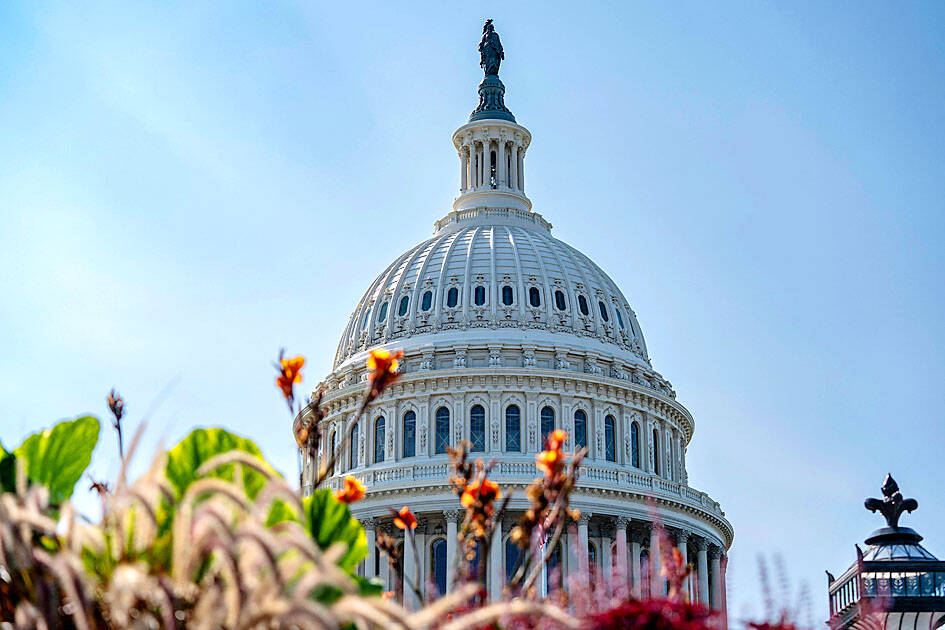The US House of Representatives on Monday passed the Taiwan Conflict Deterrence Act, aimed at deterring Chinese aggression toward Taiwan by threatening to publish information about Chinese Communist Party (CCP) officials’ “illicit” financial assets if Beijing were to attack.
The act would also “restrict financial services for certain immediate family of such officials,” the text of the legislation says.
The bill was introduced in January last year by US representatives French Hill and Brad Sherman. After remarks from several members, it passed unanimously.

Photo: AFP
“If China chooses to attack the free people of Taiwan, [the bill] requires the Treasury secretary to publish the illicit assets of Beijing’s senior-most leaders, including the names of financial institutions and maintaining accounts,” Hill said during a speech to the House.
“Let these corrupt officials explain to ordinary Chinese citizens how they acquired their riches on a government salary,” Hill added, after suggesting that Beijing “has failed to deliver a social safety net and families are battered by sinking real-estate debt.”
“This bill goes beyond naming and shaming” as it would also “cut off access” to the US financial system for CCP officials and their “immediate family,” he said. “For Chinese officials whose families profit from their ill-gotten gains, they too will find the world becoming a much smaller place.”
The Arkansas representative said that the US’ formal diplomatic recognition of Beijing in 1979 was based on the premise that “the future of Taiwan would be determined by peaceful means.”
Any actions, including a blockade of Taiwan, would “threaten regional peace and security,” Hill said.
Sherman said that the bill “is designed to put the government of China on notice that the United States is closely watching its increasing threats toward Taiwan.”
“This bill does not focus on retaliating against the Chinese government per se, but rather on individuals who are in that government,” he said.
Sherman, who represents California’s 32nd district, said the measures stipulated in the act would only be triggered if the US president exercised their authority under Section 3 of the Taiwan Relations Act.
“I don’t expect that a triggering will ever occur, but it’s important to put Beijing on notice of what would happen if their threats against Taiwan raised to that level,” Sherman said.
In Taipei yesterday, Minister of Foreign Affairs Lin Chia-lung (林佳龍) expressed gratitude to the US Congress for using a “creative and effective way” to deter Chinese military aggression toward Taiwan.
“This kind of legislation allows us to jointly deter Chinese communist expansion and to uphold peace in the Indo-Pacific region, especially cross-strait stability and security,” Lin said.

INVESTIGATION: The case is the latest instance of a DPP figure being implicated in an espionage network accused of allegedly leaking information to Chinese intelligence Democratic Progressive Party (DPP) member Ho Jen-chieh (何仁傑) was detained and held incommunicado yesterday on suspicion of spying for China during his tenure as assistant to then-minister of foreign affairs Joseph Wu (吳釗燮). The Taipei District Prosecutors’ Office said Ho was implicated during its investigation into alleged spying activities by former Presidential Office consultant Wu Shang-yu (吳尚雨). Prosecutors said there is reason to believe Ho breached the National Security Act (國家安全法) by leaking classified Ministry of Foreign Affairs information to Chinese intelligence. Following interrogation, prosecutors petitioned the Taipei District Court to detain Ho, citing concerns over potential collusion or tampering of evidence. The

Seventy percent of middle and elementary schools now conduct English classes entirely in English, the Ministry of Education said, as it encourages schools nationwide to adopt this practice Minister of Education (MOE) Cheng Ying-yao (鄭英耀) is scheduled to present a report on the government’s bilingual education policy to the Legislative Yuan’s Education and Culture Committee today. The report would outline strategies aimed at expanding access to education, reducing regional disparities and improving talent cultivation. Implementation of bilingual education policies has varied across local governments, occasionally drawing public criticism. For example, some schools have required teachers of non-English subjects to pass English proficiency

NEGOTIATIONS: The US response to the countermeasures and plans Taiwan presented has been positive, including boosting procurement and investment, the president said Taiwan is included in the first group for trade negotiations with the US, President William Lai (賴清德) said yesterday, as he seeks to shield Taiwanese exporters from a 32 percent tariff. In Washington, US Trade Representative Jamieson Greer said in an interview on Fox News on Thursday that he would speak to his Taiwanese and Israeli counterparts yesterday about tariffs after holding a long discussion with the Vietnamese earlier. US President Donald Trump on Wednesday postponed punishing levies on multiple trade partners, including Taiwan, for three months after trillions of US dollars were wiped off global markets. He has maintained a 10 percent

TRADE: The premier pledged safeguards on ‘Made in Taiwan’ labeling, anti-dumping measures and stricter export controls to strengthen its position in trade talks Products labeled “made in Taiwan” must be genuinely made in Taiwan, Premier Cho Jung-tai (卓榮泰) said yesterday, vowing to enforce strict safeguards against “origin laundering” and initiate anti-dumping investigations to prevent China dumping its products in Taiwan. Cho made the remarks in a discussion session with representatives from industries in Kaohsiung. In response to the US government’s recent announcement of “reciprocal” tariffs on its trading partners, President William Lai (賴清德) and Cho last week began a series of consultations with industry leaders nationwide to gather feedback and address concerns. Taiwanese and US officials held a videoconference on Friday evening to discuss the